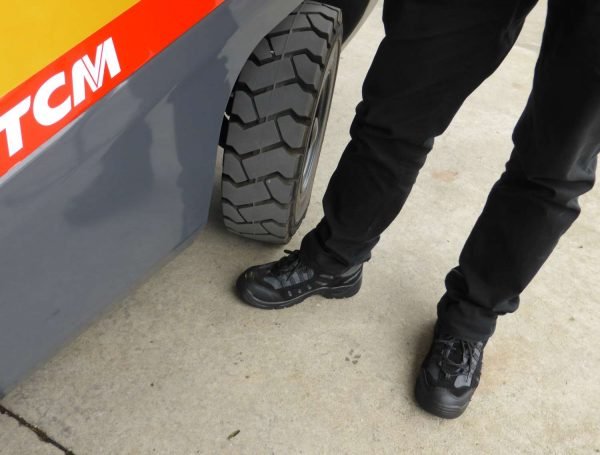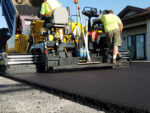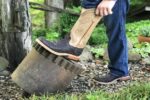When a heavy object falls on a steel toe boot, the steel toe present in the boot takes the impact and protects your toes from any damage.
Let’s face it, steel toe cannot take an infinite weight and pressure and when the steel toe is crushed with more weight than it can handle, it can crush the steel toe cap.
Naturally, the crushed steel can damage your toes and your feet. But, consider the fact that if no steel toe is present, then the injury will be more severe since there will be no protection for the toes whatsoever.

Quality Benchmarking for Steel Toe Boots
Most steel toe boots meet the ASTM F2413-11, I/75, and C/75 standards. It means, they can handle an impact of 75-foot pounds and a compression of up to 2500 pounds.
Pointless to indicate, if the load and pressure exceed the said amount, it may damage the steel toe that, in turn, can damage your toes.
Whether or Not You Should Wear Steel Toes?
The probability of your toes getting cut from steel toe is very rare. The amount of force needed to cut the toes will anyways crush your bones even if no steel toe is present. But, the chances that something will fall on your feet at such a high degree of force are rare.
On the contrary, if you won’t be wearing steel-toe boots that meet the quality benchmark, even minor impacts will most likely crush your bones.
The most common workplace accident includes dropping of a power tool, hammer, or brick. Now, normal boots can’t protect your toes from these accidents, but steel toe boots can and will.
Hence, it makes absolute sense to always wear steel toe boots at construction sites and warehouses.
Is There Any Proof that Steel Toe Boots Do Not Cut Off Your Toes?
Steel toe boots have been a cause of constant debate because of a single forklift accident that happened in Australia in the year 2002. A worker ended up losing his 3rd toe when some steel pipes fell on top of his steel toe boots. It opened a can of myth worms that steel toe boots cut off your toes.
Wherein, the truth is exactly the opposite: steel toe boots, no matter if they’re uncomfortable, do not cut off your toes. Instead, they protect your feet from getting severed or crushed.
However, many people still believe that steel caps on the steel toe boots can curl inwards if something heavy falls on top of them, and the curled steel can cut off toes. In order to find out the truth, many experiments have been conducted over the past decade.
Some of the most interesting insights were obtained from a few experiments that were conducted in a TV show, MythBusters on the Discovery Channel. Adam Savage and Jamie Hyneman conducted many tests and experiments. Out of those, 2 tests gave definite results citing that steel toe boots do not cut off toes.
The 2 tests and the results obtained from them are listed below!
1.) The Guillotine Drop Test on Boots Filled with Clay
The ANSI uses clay to determine the strength of boots. Hence, Adam and Jamie used a steel toe boot and filled it with clay. They used a Guillotine toe smasher, 75lbs in weight, to conduct the test. It was thrown from a height of 3ft on the steel toe boot that was filled with clay.
-
-
- The clay was compressed by just 0.5 inches.
- The steel didn’t curl or cut into the boots.
-
When the same test was conducted on regular boots, the clay entirely splashed.
Result: It was concluded that a steel toe boot took the maximum impact, protecting the clay inside the boot. On the contrary, the regular boot was completely shattered.
2.) The Arbor Press Test to Determine Total Failure Point
Adam and Jamie used an arbor press to destroy the steel toe boot. It was found that the boot was destroyed when the pressure of impact was 6000lbs. On the other hand, the normal boot was completely crushed at the mere pressure of 1200lbs.
Additionally, another test was conducted, the shearing attachment test. Every scenario under this test resulted in amputation only when a thin metal blade was attached to the arbor press or Guillotine toe smasher.
The Inference From all the Tests:
It was found that steel toe boots were the safest options for feet protection against every other kind of boot. The only scenario where the toes were severed was when a sharp blade fell on the boots with an impact of 1400 lbs.
Tips to Prevent Your Toes From Getting Hurt in Terms of Impact
Steel toe boots are the safest protective boots. Yet, there are some precautions that you can take to make them even safer. Have a look!
Wear thick socks – Thick socks will work as a layer cushion and take the brunt of direct impact against the steel, protecting your toes in the process. (Best Work Socks for Steel Toe Boots)
Use tongue pads – Insert them inside the boots in such a way that they cover the entire length towards the front portion of the boots. The padding will work as a thick cushion and guard your feet from directly rubbing against the hard steel surface of the boots.
Purchase high-quality steel toe boots – Always check the safety ratings, the highest are ASTM F2413-11, I/75, and C/75.
Make sure they fit – Always purchase the laced steel toe boots so that they don’t cut off your toes. Remember, you can always tighten up or loosen the boots by slightly adjusting the laces.
Safest Alternatives for Steel Toe Boots
Despite it has been proven again and again that steel toe boots are the safest workplace boots for feet protection against amputation, people still have many concerns regarding the safety of these boots.
If you want to try something else instead of steel toe boots for any reason, you can buy composite toe boots instead of any random boots.
The benefits of wearing composite toe boots include the following:
-
-
- Composite toe boots are lighter.
- Composite toe boots are more comfortable.
- Composite toe boots resist electricity, heat, and cold as well as steel toe boots.
-
Conclusion
It’s a myth that steel toe boots cut off toes. They’re the best safety protection boots for warehousing and construction jobs. If you want non-metal protection work boots, you can wear composite toe boots.







